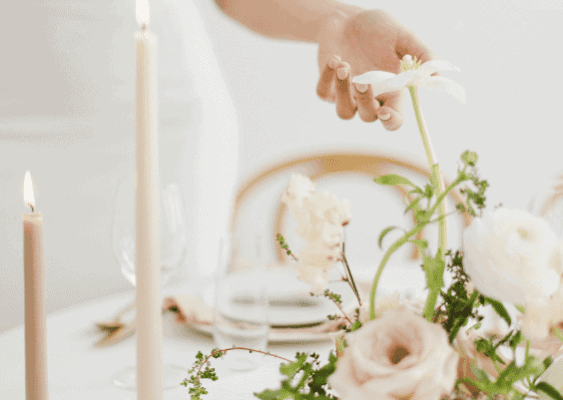Elegant women handle judgment mindfully and with care.
The dictionary may define judgment as "the ability to consider decisions or come to reasonable conclusions" but, really, I think it's so much more than that.
Judgment is our way of life. We use judgment in every aspect of our world.
We judge to find a partner, earn a living, choose our clothes for the day, say yes or no to something or someone, interact with others, parent our children, and more.
But, as necessary and valuable as judgment is, it's essential to be aware of how toxic it can be, as well.
We can't deny how powerful our brains are, but we also have to be aware of how they can sometimes still be quite primal in acknowledging their power.
That's why learning how to judge consciously and with an open heart is so important.
Can we free ourselves from toxic judgment in order to live more freely and happily? I think we can, through mindfulness.
Become aware of why you judge.
Early humans learned quickly that using good judgment was the difference between life or death. They knew where danger was – or could be – and made decisions to protect themselves.
Later on, as we continued to develop our brains and society, judging became more complicated and nuanced. The world that formed around us became more than just black and white, but multiple shades of gray, too.
Over the millennia, it's become less and less easy to determine what is safe and what is dangerous. Instead of simple problems like avoiding the cliff while harvesting berries to eat, judging becomes will I be able to afford to feed my family if I take this job?
But, somewhere along the way, humans began to overdo it.
Not only did we continue to use judgment for basic survival, but we also began criticizing and analyzing every little detail of our lives, categorizing every speck of information, and organizing memories for later use.
Our brains aren't that dissimilar to how they were hundreds of thousands of years ago. So our bodies can't distinguish well between threats to our survival and everyday stressors.
These days we can go into a stressful fight or flight mode just from our interactions with the world around us. Anything from an angry boss or client, a challenging deadline, a family emergency, or a person or situation that we deem a potential threat (big or small) can potentially send us into a spin.
When that happens, we often lose our ability to think clearly. Amid a fight or flight response, our brain increases activity in the limbic system, which is associated with our emotions. Simultaneously, it has decreased activation in areas like the prefrontal cortex, which is where our decision-making happens.
As a result, we become more susceptible to cognitive biases and logical fallacies. Thus, we are more likely to make hasty decisions based on habitual responses rather than deep thinking.
The good news? We can overcome harmful judgment by becoming more aware of why we judge.
When we gently remind ourselves that our use of judgment is based initially on our archaic need to always be on the lookout, then we can talk ourselves down off the ledge and realize that we are, in fact, safe.
Recognizing how and why you judge yourself.
Most of us, myself included when I'm not being mindful, tend to judge ourselves in the harshest light of all.
The reason could be that we are the only thing that we actually have any control over.
We cannot control the weather, our loved ones, others, or any other countless things in the world. We can control ourselves: what we think, what we say, how we see ourselves, what we do, and how we do it.
This autonomy comes at a heavy price when it comes to self-judgment.
We expect perfection from ourselves, and remembering that we are perfectly imperfect is typically a challenge for most.
Try this little journaling exercise and see what comes up for you.
- What is the first thing that comes to your mind when you wake up in the morning and look in the mirror?
- What do you say to yourself when you make a mistake?
- How do you respond when others compliment you?
- If you were to list out pros and cons about yourself, which list would be longer?
Were your answers less than positive? All of us go through negative thought patterns of toxic self-judgment, at least from time to time.
By bringing these self-judgments to light, we can acknowledge them and call them out for what they indeed are: false!
We can also address them with some exercises of self-affirmation. Changing our thoughts about ourselves can and will transform our self-image.
Because here's the real deal: how you judge yourself is not how others judge you.
Every single person on the planet will judge you differently. That judgment comes from their own experiences, their perspective, and their values and beliefs.
The point here is not to reconcile others' different opinions but to accept yourself for who you are regardless of what others think.
This not only supports a healthier self-image, but this type of conscious judgment will reveal so much more about you than you probably ever realized.
Catch yourself when you judge others.
When you walk down the street, what goes through your mind? Do you notice the thoughts you have about your surroundings and other people around you?
You're most likely doing what any average person would do: unconsciously naming things. A tree, the sky, the neighbor's house … they really need to mow their lawn!
As I mentioned above, this type of naming and classifying was helpful when our Paleolithic ancestors roamed the Earth. Still, nowadays, it's incredibly superfluous, being, for the most part, useless.
Even worse, we do this to other individuals, too! We see a person and immediately place them in a category. More often than not, the category that we put them in has its own set of names, features, and adjectives.
For example, you see a boy with a skateboard and slouchy jeans out skating in the park in the middle of a school day. You may automatically classify him as a delinquent or a "troubled youth." You may not have considered that he could be homeschooled or out of school that day for a valid reason.
I could probably give hundreds of examples just like the one just above, but most of us are aware of how and when we do it.
Try your best to catch yourself when you start to categorize the world and people around you.
I love what Eckhart Tolle describes as "watch the thinker."
He suggests that we observe how our mental processes go about their merry way, constantly judging everything in our midst. He prescribes that we stop ourselves if and when we can.
The more you practice conscious, mindful judgment, the freer your mind will be.
Realize how the ego uses judgment.
As helpful as our ability to judge is, most of us have failed to realize that its inherent value gets gobbled up by the ego.
The ego, usually a very beneficial tool of our psyche, engages in toxic judgments to make itself feel better, especially if threatened.
A perfect example here would be jealousy. When we feel jealous, the ego gets threatened and begins to counteract this by judging the situation negatively. Through toxic judgment, the ego will categorize a person as "other" and "not okay with me."
Keep in mind that much of this happens subconsciously.
You may notice a beautiful woman and try to pinpoint her flaws instead of being in awe of how extraordinary she is.
This doesn't make you a bad person. It makes you a normal human being whose ego is a keen judge and will attach negative feelings to people, places, or things whenever it feels as if it is the "lesser."
The next time you are with others, tune in to your internal dialogue: what are you saying about these people? Can you identify positive aspects about this person? Or, has your ego taken over your thoughts, and you have begun to judge others to make yourself feel better?
How can you analyze your thoughts and turn them around in a more positive light?
The more focused we can become on how and why we judge, the easier it will be when we approach the world's unknowns. We won't fall into outdated modes of thinking but can see the world with fresh eyes and open hearts.
We need to judge the world to survive, but we do not need it to thrive.
What would your life be like if you were free of this type of toxic judgment? How much happier could you be if you didn't have to worry about constantly deciphering the world, people, and situations?
Judgment is useful – until it's not.
When we strive to be conscious about our thoughts and feelings, we create a healthier state of mind for ourselves and more beneficial interactions with others and the world around us.
Self-Image Makeover
Live Your Life With Style, Flare, and Elegance
IF YOU LIKE IT, SHARE IT






